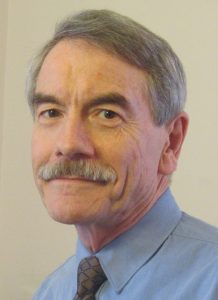Hutchinson honored for his work on electron holes in phase space

MELVILLE, NEW YORK, Oct. 17, 2022 — AIP Publishing has selected Ian H. Hutchinson, a professor of nuclear science and engineering at Massachusetts Institute of Technology, as the recipient of its 2022 Ronald C. Davidson Award for Plasma Physics for his paper, “Electron holes in phase space: What they are and why they matter.”
The annual award of $5,000 is presented in collaboration with the American Physical Society’s Division of Plasma Physics to recognize outstanding plasma physics research by a Physics of Plasmas author.
“This paper introduces readers to the fascinating nonlinear phenomenon of solitary peaks in the electric potential that sustain themselves by a decrease of the population of trapped electrons called the phase-space hole,” said Michael Mauel, editor-in-chief of Physics of Plasmas. “It is exciting to see highly influential papers like this commended with the Ronald C. Davidson Award.”
Electron holes arise from instabilities that occur in a vast range of plasma environments within nature and the laboratory. They often last for long times, and they take on individual identities as composite objects that move and interact in interesting and sometimes surprising ways.
“I became interested in electron holes because of my efforts to clarify how electric probe measurements of flowing plasmas really work,” said Hutchinson. “My students and I were doing simulations and began observing the formation of electron holes as a central part of the nonlinear behavior of the plasma. Holes turned out to be responsible for much of what happens in the plasma wake of a probe as the plasma flows past it.”
Hutchinson became further intrigued by the substantial literature about electron holes in near-earth space plasmas, measured by satellites, and realized the same type of phenomena he and his students were exploring was also happening here.
Since writing his paper, Hutchinson has spent six fruitful years working on the outstanding challenges identified in the paper. He and collaborator David Malaspina, an assistant professor of astrophysical and planetary sciences at the University of Colorado, analyzed data gathered from two satellites orbiting the moon to look for electron holes.
“My theories predicted that the moon wake should be full of electron holes, and the satellite measurements Malaspina analyzed resoundingly confirmed that prediction,” Hutchinson said. “So now when you look up at night at the moon, think about the solar wind flowing past it, and realize that for a distance of approximately 10 moon radii, streaming out from its dark side, there is a wake full of plasma electron holes.”
Last year, Hutchinson showed holes can move as slowly as the plasma ions — but only if the ion velocity distribution function has two humps, between which the hole velocity lies.
“Some new satellite observations came out almost simultaneously that showed precisely this condition in certain regions of the magnetosphere,” he said. “It is enormously satisfying to be part of the growth of our scientific knowledge by the interaction of theory, simulation, and observation.”
The 2022 Ronald C. Davidson Award for Plasma Physics will be presented to Hutchinson during the 64th Annual Meeting of the APS Division of Plasma Physics.
###
ABOUT THE RONALD C. DAVIDSON AWARD FOR PLASMA PHYSICS
The award is provided by AIP Publishing in honor of Ronald Davidson’s exceptional contributions as Editor-in-Chief of Physics of Plasmas for 25 years. The annual award of $5,000 is presented in collaboration with the American Physical Society’s Division of Plasma Physics and recognizes outstanding plasma physics research by a Physics of Plasmas author.
ABOUT AIP PUBLISHING
AIP Publishing is a wholly owned not-for-profit subsidiary of the American Institute of Physics (AIP). AIP Publishing’s mission is to support the charitable, scientific and educational purposes of AIP through scholarly publishing activities in the fields of the physical and related sciences on its own behalf and on behalf of our publishing partners to help them proactively advance their missions.
For more information:
Wendy Beatty
media@aip.org
301-209-3090
